To ease hangover symptoms, try a herbal tea blend of ginger and peppermint for soothing digestion, or chamomile and lemon for relaxation. Ginger effectively reduces nausea and aids digestion, while peppermint relieves headaches. Chamomile promotes better sleep, and lemon helps with hydration. These blends not only replenish fluids but also offer anti-inflammatory benefits to combat discomfort. Remember to steep your herbs for 5 to 10 minutes in hot water for the best flavor. If you're curious about other effective remedies and brewing tips, there's plenty more to explore.
Understanding Hangover Symptoms
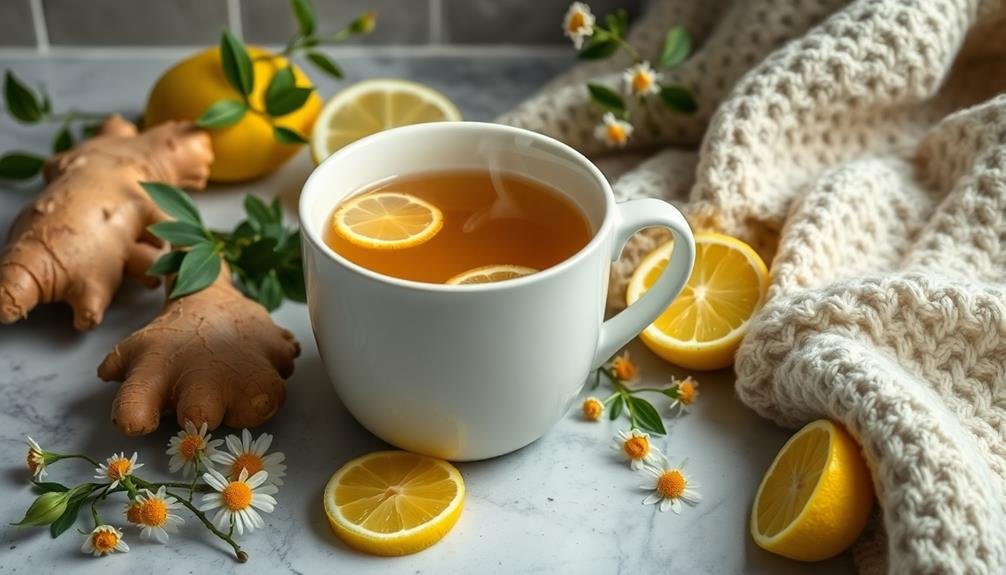
What exactly are hangover symptoms, and why do they occur? When you drink alcohol, it impacts your body in several ways, leading to a range of symptoms the next day. You might experience headaches, fatigue, nausea, and sensitivity to light and sound. These symptoms usually arise due to dehydration, electrolyte imbalances, and the toxic byproducts of alcohol metabolism.
Your body's reaction to alcohol can also disrupt your sleep cycle, leaving you feeling exhausted. Additionally, alcohol irritates your stomach lining, which can cause that nagging nausea.
You may also notice mood swings or anxiety, thanks to the chemical changes in your brain triggered by alcohol consumption.
The severity of hangover symptoms often depends on the amount and type of alcohol you consume, along with factors like your hydration levels and overall health.
While you can't completely avoid hangovers if you drink, understanding these symptoms helps you recognize what you're dealing with. This awareness can guide you in seeking relief, whether through hydration, rest, or natural remedies.
Ultimately, knowing what's happening in your body can empower you to take steps toward feeling better.
Benefits of Herbal Tea
When you're dealing with a hangover, herbal tea can be your best friend.
It not only helps with hydration and recovery but also offers anti-inflammatory properties and digestive support.
Understanding these benefits can make a real difference in how you feel.
Hydration and Recovery
Staying hydrated is essential for recovering from hangover symptoms, and herbal tea offers a soothing solution. When you've overindulged, your body craves fluids, and herbal tea can help replenish lost hydration while also providing additional benefits.
Here's a quick look at some herbal teas that can support your recovery:
| Herbal Tea | Benefits | Preparation Tips |
|---|---|---|
| Ginger Tea | Aids digestion | Steep fresh ginger slices |
| Peppermint Tea | Relieves nausea | Brew with fresh leaves |
| Chamomile Tea | Promotes relaxation | Use dried flowers |
| Lemon Balm Tea | Reduces stress | Steep leaves in hot water |
Each of these teas serves as a gentle way to rehydrate. They not only provide essential fluids but also can help soothe your stomach and promote a sense of calm during a rough recovery period. So, whenever you feel the effects of a hangover creeping in, consider brewing a warm cup of herbal tea. It's a simple, effective way to support your body and aid in a quicker recovery.
Anti-inflammatory Properties
Herbal tea boasts impressive anti-inflammatory properties that can aid in your recovery from hangover symptoms. When you've overindulged, your body often experiences inflammation, leading to discomfort and sluggishness. Drinking herbal teas like ginger or chamomile can help reduce this inflammation, promoting a quicker return to feeling like yourself.
Ginger tea, in particular, is known for its potent anti-inflammatory effects. It contains compounds called gingerols and shogaols that can help soothe your body and alleviate headaches, one of the most common hangover symptoms.
Chamomile tea also works wonders by reducing inflammation and relaxing your body, making it easier to rest and recover.
Furthermore, herbal teas often contain antioxidants, which can further support your body's healing process. These antioxidants combat oxidative stress that may arise from alcohol consumption, helping your body restore balance.
Digestive Support Benefits
After addressing inflammation, it's important to contemplate how herbal tea can also support your digestive system, especially after a night of drinking. Herbal teas like peppermint, ginger, or chamomile can ease discomfort and promote digestion. When you've overindulged, your stomach may feel upset, and these herbal ingredients can help alleviate that feeling.
Peppermint tea relaxes the muscles of your gastrointestinal tract, helping to relieve bloating and gas. Ginger tea is renowned for its anti-nausea properties, making it a great choice if you're feeling queasy. Chamomile tea not only calms your mind but also soothes your stomach, reducing spasms and discomfort.
Drinking warm herbal tea can stimulate the digestive process, helping your body to break down food more effectively. It's also a great way to rehydrate, which is essential after drinking alcohol.
Key Ingredients for Relief
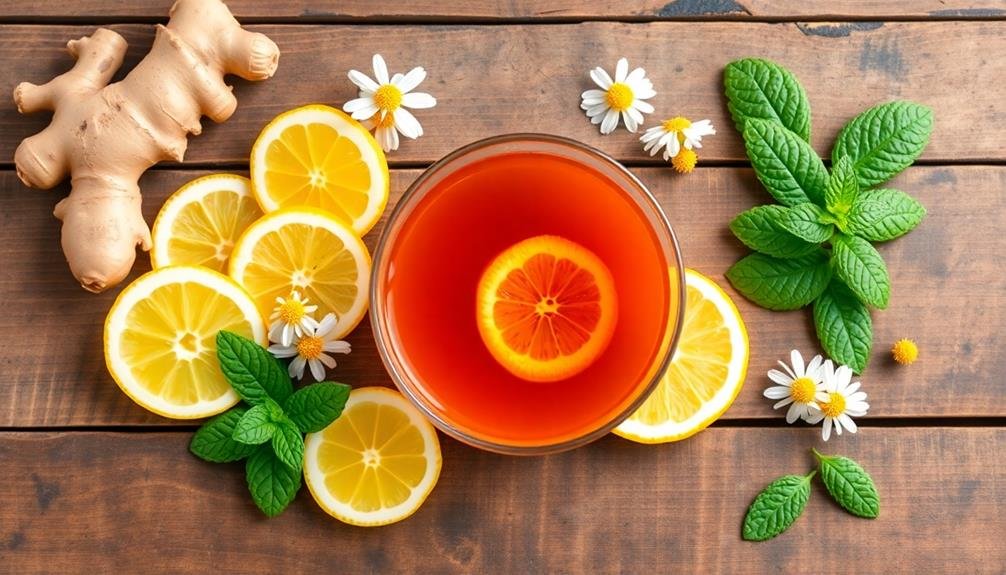
When you're battling a hangover, certain key ingredients in herbal teas can provide much-needed relief. These ingredients work together to soothe your symptoms, helping you feel better faster. Here are some essential components to look for in your herbal tea:
| Ingredient | Benefits |
|---|---|
| Ginger | Reduces nausea and aids digestion |
| Peppermint | Relieves headaches and soothes stomach discomfort |
| Chamomile | Promotes relaxation and improves sleep quality |
| Lemon | Hydrates the body and provides vitamin C |
Incorporating these ingredients into your herbal tea can make a significant difference. Ginger is particularly effective for calming your stomach, while peppermint can tackle that pounding headache. Chamomile's gentle properties can help you relax, making it easier to drift off to sleep. Finally, lemon can not only refresh your drink but also hydrate and invigorate you.
Popular Herbal Tea Blends
Combining the right ingredients can elevate your hangover relief experience, and popular herbal tea blends offer a variety of flavors and benefits. One popular blend is chamomile and peppermint. Chamomile soothes your stomach while peppermint can help reduce nausea, making this duo a great choice for hangover recovery.
Another favorite is ginger and lemon. Ginger is known for its anti-nausea properties, while lemon adds a zesty flavor and can help detoxify your body. This invigorating blend not only tastes great but also aids digestion.
If you're looking for something more calming, try a blend of lavender and hibiscus. Lavender promotes relaxation and can help alleviate headaches, while hibiscus is rich in antioxidants and can support hydration.
Lastly, a mix of rooibos and turmeric is gaining popularity. Rooibos is caffeine-free and packed with minerals, while turmeric has anti-inflammatory properties that can help with overall recovery.
These blends not only taste delicious but also provide the necessary support to help you feel better after a night of indulgence. So, next time you're dealing with a hangover, consider brewing one of these herbal tea blends for some much-needed relief.
DIY Herbal Tea Recipe
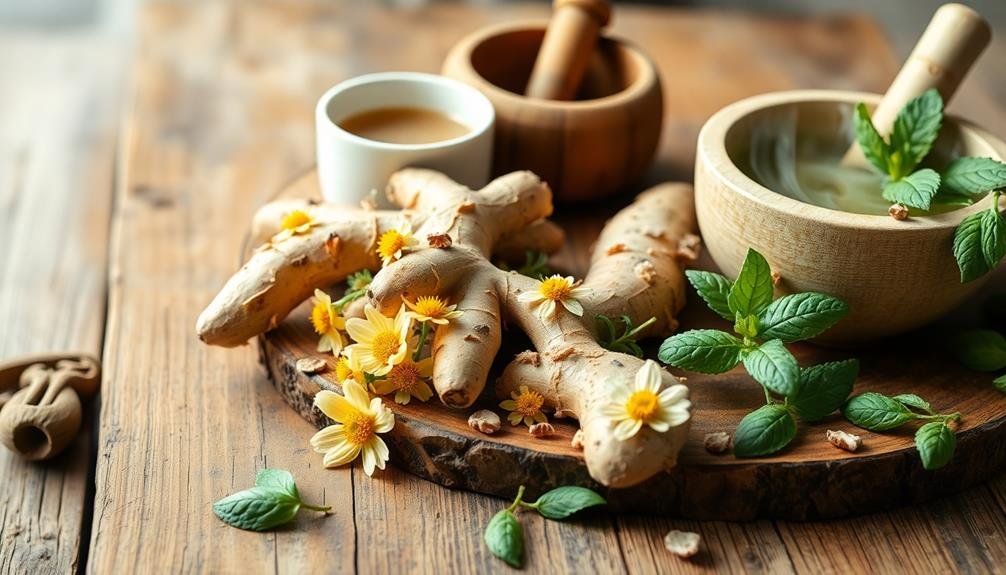
If you're looking to whip up your own herbal tea for hangover relief, you'll want to gather some key ingredients that pack a punch.
Brewing it's a breeze, and I'll walk you through simplified instructions to make the process easy.
Plus, I'll share some serving tips to enhance your tea experience!
[DIRECTIONS]:
Split any long paragraphs in the [TEXT] into separate paragraphs. Write the entire [TEXT] again, but with any long paragraphs split.
Retain any and all special formatting (e.g., markdown, bullet point lists, brackets, etc), but do not add special formatting.
Key Ingredients for Relief
Sipping on a soothing herbal tea can be a game-changer for alleviating hangover symptoms. To create an effective blend, focus on key ingredients that offer relief.
Start with ginger, which helps reduce nausea and improve digestion. You'll find it's particularly effective when you're feeling queasy after a night out.
Next, consider adding peppermint. This herb not only freshens your breath but also soothes headaches and digestive issues. Its cooling properties can be incredibly invigorating and calming.
Don't forget about chamomile. Known for its relaxing qualities, chamomile can help you unwind and promote better sleep, which is essential for recovery. It also aids digestion, easing any stomach discomfort you might experience.
Another great addition is lemon, which hydrates and replenishes lost electrolytes. Its vitamin C can boost your immune system, helping you feel better faster.
Lastly, a sprinkle of honey can add natural sweetness and provide antioxidants. It's a fantastic way to enhance the flavor while also supporting your body's recovery process.
Combine these ingredients, and you'll have a powerful herbal tea blend ready to help you recover from a hangover.
Brewing Instructions Simplified
To enjoy the benefits of your herbal tea blend, follow these simple brewing instructions.
Start by gathering your key ingredients: dried chamomile, ginger, peppermint, and lemon balm. You'll want about one teaspoon of each herb for a single cup of tea. If you're making a larger batch, just scale up accordingly.
Next, boil water in a kettle. Once it reaches a rolling boil, remove it from the heat and let it cool for about 30 seconds. This step's important because boiling water can scorch delicate herbs, affecting the flavor.
Place your herbs in a tea infuser or directly into your cup. Pour the hot water over the herbs, making sure they're fully submerged. Let the mixture steep for about 5 to 10 minutes, depending on how strong you like it.
After steeping, remove the herbs. If you used a tea infuser, just lift it out.
Now, taste your tea. If you want, you can add honey or lemon to enhance the flavor. Enjoy your soothing herbal tea blend, and let it work its magic on those hangover symptoms!
Serving Suggestions and Tips
Enhancing your herbal tea experience can elevate its soothing effects, especially when tackling hangover symptoms. To create a DIY herbal tea blend that's effective and enjoyable, start with a base of chamomile or ginger. Both have anti-inflammatory properties that can help soothe your stomach.
You can add peppermint for a revitalizing twist and to aid digestion. A touch of honey not only sweetens your tea but also provides a quick energy boost. If you're feeling particularly dehydrated, consider including a slice of lemon for vitamin C and added flavor.
When serving, make sure to enjoy your tea warm, as the heat can enhance relaxation. Pour it into a favorite mug to create a comforting ritual. You might also want to pair your tea with light snacks like toast or crackers to help settle your stomach.
Lastly, stay hydrated! Drink water throughout the day alongside your herbal tea. This combination will support your recovery and help you feel better faster.
Brewing Techniques for Optimal Flavor
Brewing herbal tea effectively can make all the difference in flavor and aroma, especially when you're trying to soothe hangover symptoms. Start by using fresh, high-quality herbs. Whether you're using loose leaf or tea bags, the quality of the ingredients greatly impacts the taste.
Next, pay attention to the water temperature. For most herbal teas, a temperature of around 200°F (just below boiling) works best. If you're using delicate herbs like chamomile, let the water cool slightly to avoid bitterness.
Timing is essential too. Steep your tea for about 5 to 10 minutes, depending on your preference. A longer steeping time may enhance flavor but can also introduce a more robust taste, which mightn't be to your liking.
Tips for Maximum Effectiveness
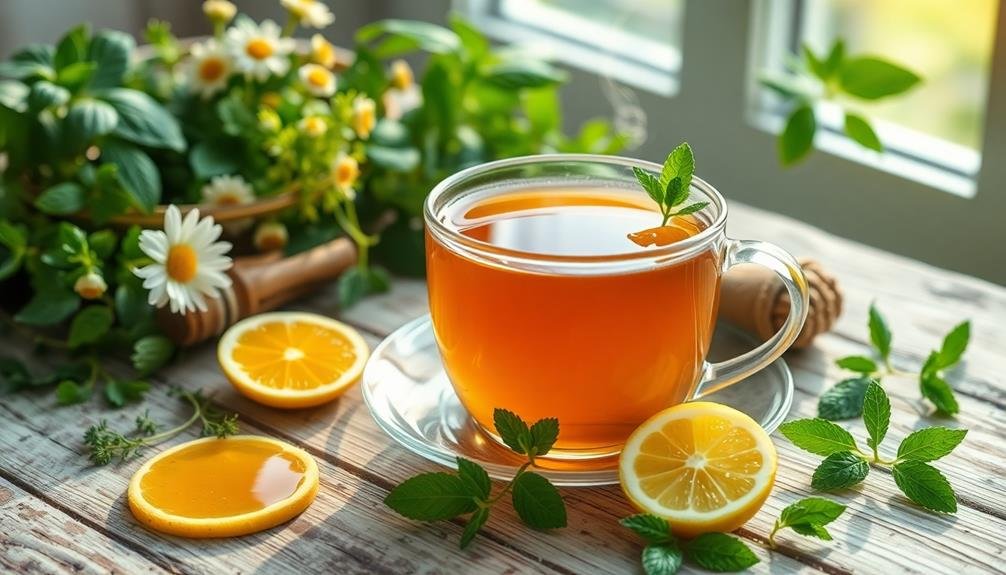
When it comes to maximizing the effectiveness of herbal tea for hangover relief, choosing the right herbs is essential. Opt for ingredients like ginger, peppermint, and chamomile. Ginger can help reduce nausea, while peppermint soothes headaches and aids digestion. Chamomile promotes relaxation and can improve sleep quality, which is often disrupted after a night of drinking.
Next, pay attention to the brewing time and temperature. Steep your tea for about 5 to 10 minutes in hot water, but avoid boiling water, as it can diminish the herbs' beneficial properties. If you want additional benefits, consider adding honey or lemon to your tea. Honey provides natural sweetness and has antioxidant properties, while lemon offers a revitalizing zing and may help detoxify.
Don't forget to stay hydrated! Drink plenty of water alongside your herbal tea to combat dehydration, a common hangover symptom.
Try sipping the tea slowly to allow your body to absorb the nutrients effectively. Finally, enjoy your tea in a calm, relaxing environment to enhance its soothing effects. With these tips, you'll be well on your way to feeling better in no time.
Precautions and Considerations
While herbal tea can be a fantastic remedy for hangover symptoms, there are some precautions and considerations to keep in mind.
First, not all herbal ingredients are safe for everyone. If you're pregnant, nursing, or have specific health conditions, consult your doctor before trying any new herbal blends. Some herbs can interact with medications, so it's essential to check for potential side effects.
Additionally, pay attention to caffeine content. While many herbal teas are caffeine-free, some blends may include ingredients like yerba mate or green tea, which can lead to dehydration if consumed in excess, especially when you're already feeling the effects of a hangover.
It's also wise to stay hydrated with water alongside your herbal tea to combat dehydration. Avoid overly sweetened blends, as sugar can worsen a hangover.
Additional Remedies for Hangovers
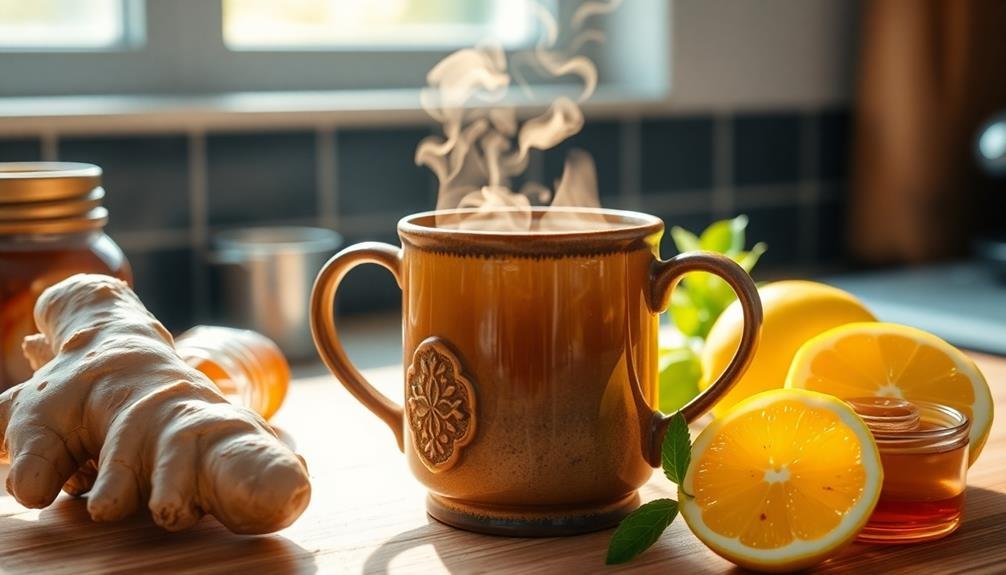
If you're looking for ways to alleviate hangover symptoms beyond herbal tea, several additional remedies can help you feel better. Staying hydrated is vital, so make sure to drink plenty of water or electrolyte-rich beverages.
Eating a hearty breakfast can also work wonders; try to include foods that are high in carbohydrates and proteins to restore your energy levels.
Here are a few remedies to reflect upon:
- Ginger Tea: Ginger can soothe your stomach and reduce nausea. Brew some ginger tea or chew on fresh ginger slices for relief.
- Bananas: This fruit is high in potassium, which helps replenish electrolytes lost during drinking. Snack on a banana to help stabilize your body.
- Peppermint Oil: A few drops of peppermint oil in your tea or inhaled directly can ease headaches and improve overall comfort.
Combining these remedies with your herbal tea can enhance your recovery.
Listen to your body, rest, and give yourself time to recuperate. With the right approach, you'll bounce back in no time!
Frequently Asked Questions
Can Herbal Tea Prevent a Hangover Before Drinking?
While herbal tea can't guarantee a hangover-free experience, sipping on hydrating blends like ginger or peppermint before drinking might help reduce some symptoms. Staying hydrated and moderating intake is key for prevention, too.
How Long Does It Take for Herbal Tea to Relieve Symptoms?
It usually takes about 30 minutes to an hour for herbal tea to relieve symptoms. You'll feel the effects as the soothing properties hydrate and calm your stomach, helping you recover more quickly from discomfort.
Are There Any Side Effects of Herbal Tea for Hangovers?
Herbal teas can cause side effects like stomach upset or allergic reactions. You should pay attention to how your body reacts. If you experience discomfort, it's best to stop drinking and consult a healthcare professional.
Can I Drink Herbal Tea With Other Hangover Remedies?
You can definitely drink herbal tea alongside other hangover remedies. Combining remedies can enhance their effectiveness, but make sure to listen to your body and avoid overwhelming it with too many ingredients at once.
What Time of Day Is Best to Drink Herbal Tea for Hangover Relief?
You'll find that drinking herbal tea in the morning helps kickstart your recovery. It hydrates and soothes your stomach, setting a positive tone for the day while alleviating some of those lingering hangover symptoms.
In Summary
Incorporating herbal tea blends into your hangover recovery can make a real difference. By understanding your symptoms and choosing the right ingredients, you can find relief and feel better faster. Experimenting with popular blends or creating your own DIY recipe adds a personal touch to your recovery. Just remember to brew it properly and stay mindful of any precautions. With these tips, you'll be well on your way to tackling those hangover blues and enjoying your next gathering!

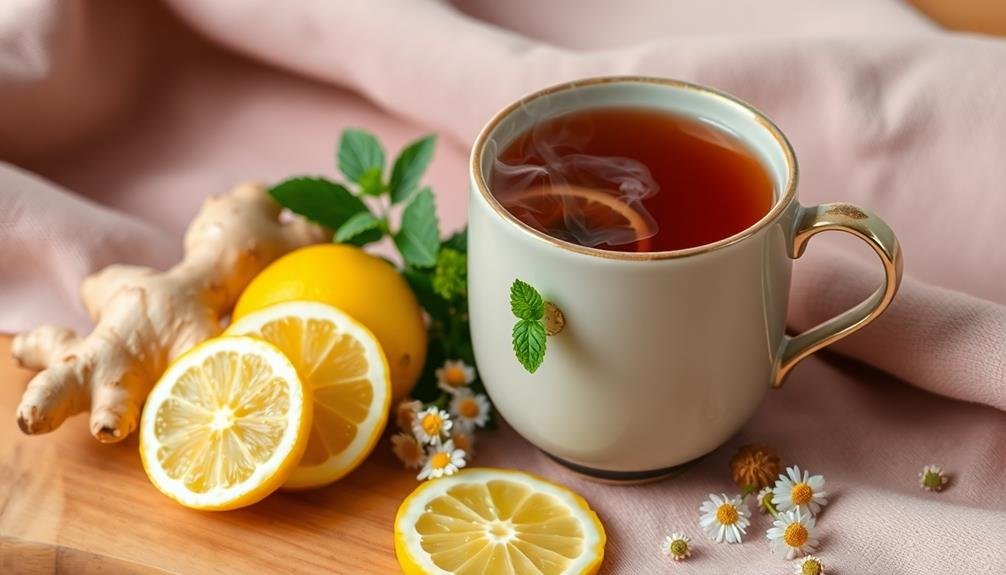
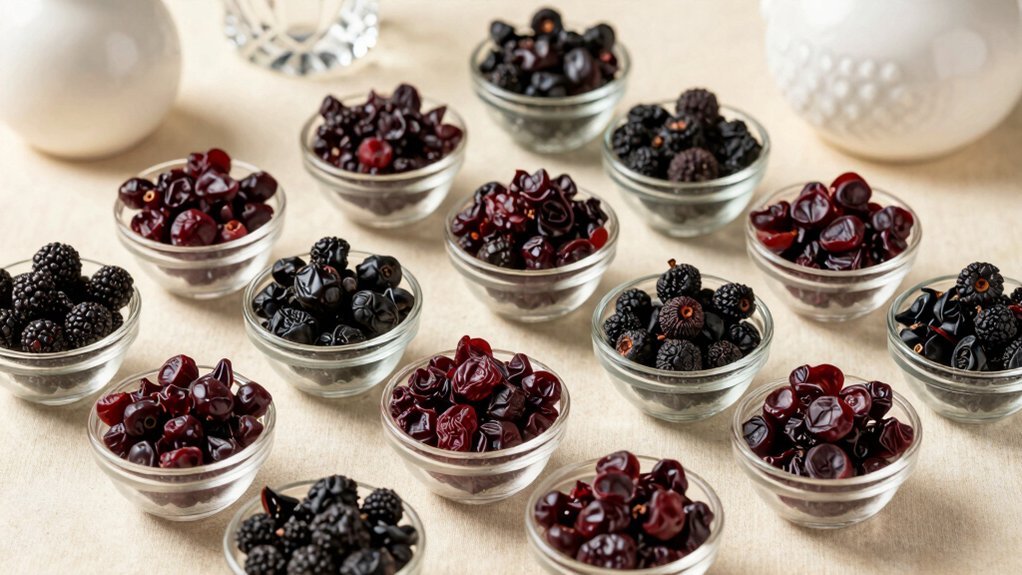
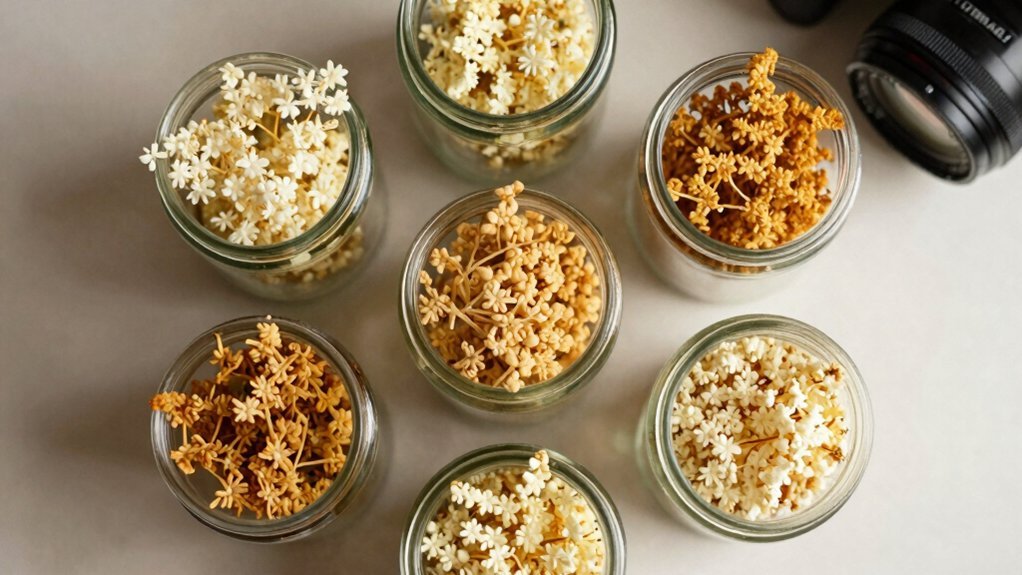
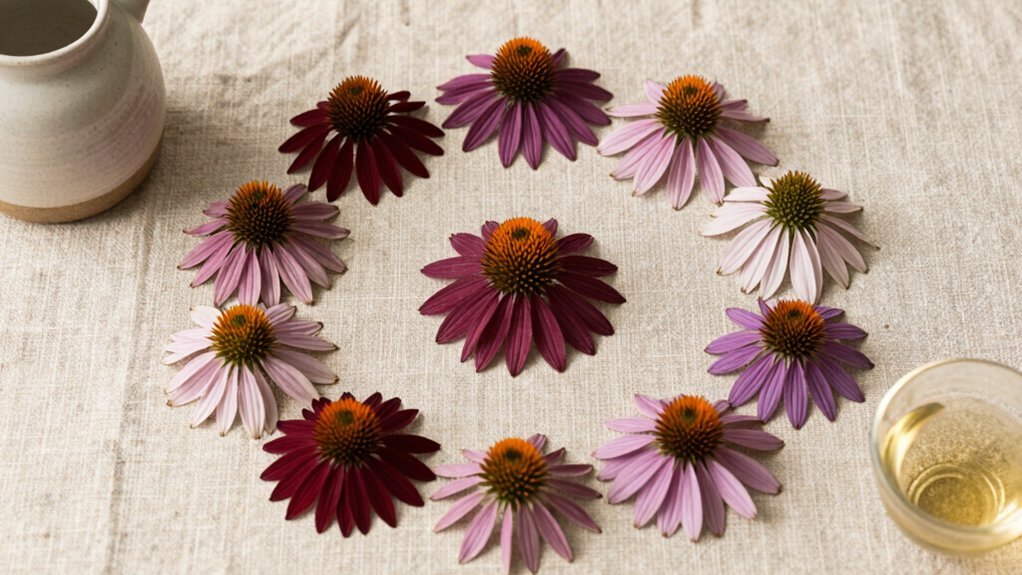
Leave a Reply